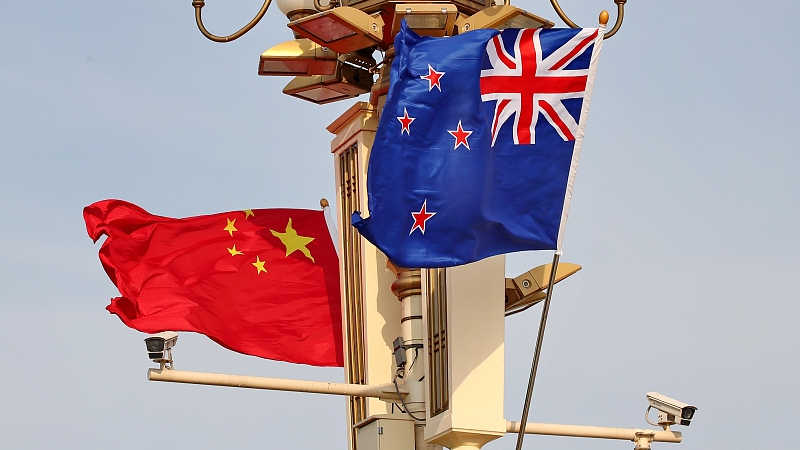
The flags of China and New Zealand, Beijing, China, June 25, 2023. /CFP
The flags of China and New Zealand, Beijing, China, June 25, 2023. /CFP
Editor's note: Ruqiya Anwar, a special commentator on current affairs for CGTN, is a Ph.D. scholar of Media and Communication Studies in Pakistan. The article reflects the author's opinions and not necessarily the views of CGTN.
Chris Hipkins, the prime minister of New Zealand, has arrived in Beijing for an official visit to China on June 25. This is Hipkins's first trip to China since becoming the leader of the Labour Party and New Zealand's prime minister in January 2023. During the visit, the two leaders will engage in an in-depth exchange of views on bilateral relations and international and regional issues of mutual interest. The gathering between the leaders has proved once again the stability of China-New Zealand relations.
China and New Zealand have persistently promoted the institutionalization of their bilateral relationship, establishing a solid foundation of political mutual trust despite the changing international environment. In the context of intensifying great power competition and escalating geopolitical risks, the stable development of China-New Zealand relations has essential and illustrative value for the international community.
One of the key factors behind the success of New Zealand's independent foreign policy is its ability to resist external pressures, particularly from Western countries such as the United States. The independence of New Zealand's foreign policy has been a significant factor in the stability of relations between China and New Zealand.
Wellington's diplomatic efforts to build a trusting relationship with Beijing have focused on finding areas of agreement, valuing differences, and avoiding meddling from outside parties. Strong ties between the two countries have allowed for the growth of businesses including education, tourism, and agriculture, and are evidence of the benefits of New Zealand's policy of independence in international affairs. The stability and growth of the China-New Zealand relationship have benefited both nations. New Zealand's economy and people have benefited from accepting China as a valued partner.
Educational and tourism interactions between the two countries have grown during the previous two decades. China was New Zealand's largest source of overseas students and second-biggest source of tourists until the COVID-19 epidemic. According to Prime Minister Hipkins, China is crucial to New Zealand's economic revival. His trip to China should strengthen business ties and open new paths of cooperation. China-New Zealand ties demonstrate mutual benefits and win-win collaboration.

The view of the ports of Auckland, New Zealand, March 23, 2022. /Xinhua
The view of the ports of Auckland, New Zealand, March 23, 2022. /Xinhua
Another significant component of the bilateral relationship is proactive cooperation. New Zealand was one of the first countries to recognize China as a market economy and support its WTO membership.
New Zealand's willingness to participate in forward-looking efforts like climate change cooperation and creative development projects in the South Pacific shows the countries' shared commitment to addressing global issues and improving regional well-being.
China and New Zealand are economically complementary, offering much potential for collaboration. The updated China-New Zealand Free Trade Agreement provides a firm framework for bilateral economic and trade cooperation, with enormous potential in goods, services, and digital commerce. Both nations may benefit from these synergies and deepen their ties by making use of them.
New Zealand's independent diplomacy with China influences Western nations' engagement with China. Mutual benefits and win-win outcomes can be reached by cultivating partnerships based on national interests rather than blindly embracing a confrontational approach.
The meetings between the leaders of China and New Zealand convey an important message to regional nations and the international community as a whole. They stress the significance of jointly addressing global threats, rejecting ideological prejudices, and abandoning cold war mentalities. Only through such collaborative efforts will we be able to chart a course consistent with the positive trend of history.
The commitment of New Zealand to a stable and mutually beneficial relationship with China encourages the Western world to adopt a pragmatic and constructive stance. Countries can forge stronger ties with China, capitalize on common goals, and help contribute to a more harmonious and prosperous world order by following New Zealand's path.
China-New Zealand relations guide the world amid rising geopolitical challenges and global uncertainty. The two countries have established a stable and mutually beneficial relationship, which serves as a model for some Western countries. This relationship is built upon independent foreign policy, proactive cooperation, and economic complementarity. By focusing on national interests, recognizing differences, and resisting outside interference, New Zealand has been able to maintain autonomy, influence, and economic opportunities through its partnership with China.
(If you want to contribute and have specific expertise, please contact us at opinions@cgtn.com. Follow @thouse_opinions on Twitter to discover the latest commentaries in the CGTN Opinion Section.)